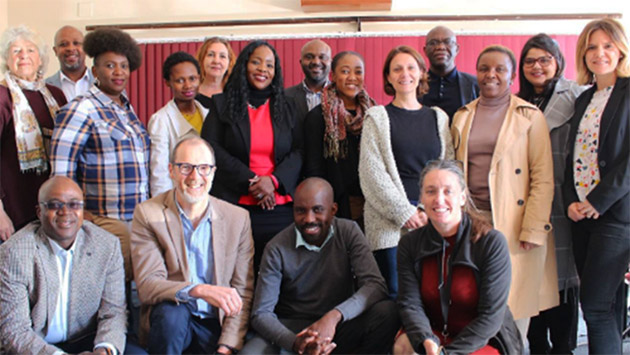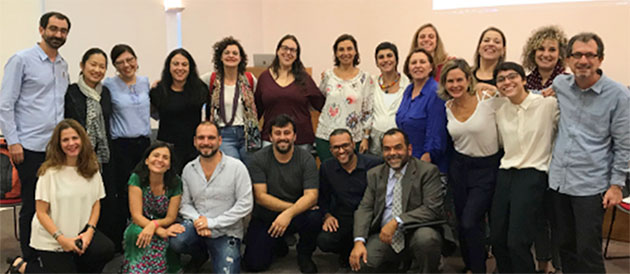Cape Town, South Africa
Fifteen high-level representatives from government, NGOs, and research organisations came together in August 2019 at the Alan J Flisher Centre for Public Mental Health in Cape Town. Together they passionately discussed how to improve future life chances of South African young people.
In South Africa, youth unemployment is one of the most pressing policy issues, with rates as high as 50%. Mental ill-health was discussed as a key factor contributing to and resulting from unemployment. Increasing access to mental health support was thus a priority issue.
The group discussed how CHANCES-6 provides an opportunity to understand how national anti-poverty programmes improve household financial security, which can feed into better mental health and wellbeing amongst young people. Access to these programmes was also a major factor that the group wanted to see addressed by the research.
The group emphasised that mental health is still a neglected topic in South Africa. The planned interviews and focus groups with young people had an important role in providing knowledge about how young people experienced mental health problems. They thought that it was equally important to investigate sources of strengths that young people and communities often draw on (such as spiritual, cultural, and religious supports). These would be important to consider when designing programmes.
 Stakeholders attending the workshop in South Africa: (top row, left to right) Francie Lund (WIEGO), Christopher Louw (Harambee), Poppie Skatane (National Department of Basic Education), Khodani Nematei (Harambee), Katherine Hall (Children’s Institute, UCT), Maureen Mogotsi (Nat. Dep. of Social Development), Benny Obayi (Child Welfare), Senzelwe Mthembu, Arianne De Lannoy, Caesar Vundule (SASSA), Dudu Shiba (National Department of Health), Nousheena Firfirey (Western Cape Dep. of Health), Emily Garman (CHANCES-6, UCT); (bottom row, left to right) Wycliffe Otieno (UNICEF South Africa), Crick Lund (CHANCES-6, UCT & KLC), Klaas Baloyi (Nat. Dep. of Social Development), Lucy Jamieson (Children’s Institute, UCT)
Stakeholders attending the workshop in South Africa: (top row, left to right) Francie Lund (WIEGO), Christopher Louw (Harambee), Poppie Skatane (National Department of Basic Education), Khodani Nematei (Harambee), Katherine Hall (Children’s Institute, UCT), Maureen Mogotsi (Nat. Dep. of Social Development), Benny Obayi (Child Welfare), Senzelwe Mthembu, Arianne De Lannoy, Caesar Vundule (SASSA), Dudu Shiba (National Department of Health), Nousheena Firfirey (Western Cape Dep. of Health), Emily Garman (CHANCES-6, UCT); (bottom row, left to right) Wycliffe Otieno (UNICEF South Africa), Crick Lund (CHANCES-6, UCT & KLC), Klaas Baloyi (Nat. Dep. of Social Development), Lucy Jamieson (Children’s Institute, UCT)
Bogotá, Colombia
NGO representatives and a select group of senior government officials working in national planning and welfare met with the CHANCES-6 research team at the Universidad de los Andes (Bogotá) in April 2019.
The group discussed how the situation for young people in Colombia is predominantly influenced by post-conflict trauma and violence, with young people in rural areas often suffering the most due to a lack of opportunities.
Julián Torres, director of the national cash transfer programme Jóvenes en Acción (Youth in Action), explained that the programme targets young people living in poverty and provides them with financial support to attend education programmes. The programme has demonstrated that it is achieving its primary goals in terms of education and employment. However, not much is known about its potentially wider impact on young people's mental health and wellbeing.
Workshop attendees agreed that the knowledge generated by CHANCES-6 could inform the future design and evaluation of anti-poverty programmes. Representatives also highlighted opportunities for CHANCES-6 to inform national policies (such as the National Development Plan and the cross-sector white paper known as COMPASS).
Workshop attendees felt there was an urgent need to understand best practice in this area, noting the opportunity to learn from the other CHANCES-6 countries. Maria Guhl (UNICEF) talked about the importance of involving young people in the research and was keen to support CHANCES-6 in achieving this.
 Stakeholders attending the workshop at Universidad de los Andes (from left to right): Bibiana Taboada and Julian Torres (Departamento para la Prosperidad Social), Nicolás Agudelo (representing Óscar Javier Siza Moreno, Ministerio de Salud), Carolina Suárez (Departamento Nacional de Planeación), María Camila Villar Guhl (UNICEF), Mariana Matamoros (representing Óscar Javier Siza Moreno, Ministerio de Salud)
Stakeholders attending the workshop at Universidad de los Andes (from left to right): Bibiana Taboada and Julian Torres (Departamento para la Prosperidad Social), Nicolás Agudelo (representing Óscar Javier Siza Moreno, Ministerio de Salud), Carolina Suárez (Departamento Nacional de Planeación), María Camila Villar Guhl (UNICEF), Mariana Matamoros (representing Óscar Javier Siza Moreno, Ministerio de Salud)
São Paulo, Brazil
Nineteen senior representatives of the municipality of São Paulo, São Paulo State, and mental health institutions came together in August 2019 at MacKenzie Presbyterian University to discuss CHANCES-6.
They discussed the urgent need to design programmes for young people that specifically address the mental health impact of poverty-related factors such as violence, drug use, and homelessness.
The group discussed opportunities for linking the national cash transfer programme (Bolsa Famila) with mental health support for young people. For most attendees the event was a real eye-opener because they had "never thought of a link between the Bolsa Familia Program and mental health". At the same time the issue resonated strongly with their own experiences of the benefits of Bolsa Familia: "We see improvements in the education of these young people [who attend the program] ... because of mental health benefits", said one, while another reported that young people's mental health improved when "their mothers are less distressed".
The CHANCES-6 findings from the forthcoming economic analyses appeared to have great potential in terms of convincing governments to invest in relevant programmes. Attendees were enthusiastic about future collaborations on these issues across the institutions and disciplines that they represented, from social welfare, mental health, and community to culture and criminal justice.
 Stakeholders attending the workshop at Mackenzie Presbyterian University in São Paulo (SP), Brazil: Top row left to right: Leon Garcia (Universidade de SP), Tereza Endo (Municipality SP), Cristina FS Nagai (SP State), Janaína Lopes (CAPS Mooca), Isadora Souza (Pontifícia Univ. Católica de SP - PUC-SP), Marília Rovaron (Culture and Community Action, CENPEC), Rosane Lowenthal (Santa Casa de SP), Isabela Gomes (Municipality SP), Márcia Francine (Municipality SP), Roxane Alencar Coutinho (Municipality SP), Marina Sdoia (PUC-SP), Rosangela Elias (SP State), Cristiane Silvestre de Paula (CHANCES-6), Julia Magalhães (Mackenzie Univ.), Décio Perroni (Municipality SP); Front row left to right: Heloísa de Souza (Santa Casa de SP), Sônia Francine Gaspar Marmo (Municipality SP), Paulo Malvasi, (CHANCES-6), Luiz Fernando Francisquini (Municipality SP), Luciano Araújo (Municipality SP), Eduardo Dias (Criminal Justice Prosecutor's Office)
Stakeholders attending the workshop at Mackenzie Presbyterian University in São Paulo (SP), Brazil: Top row left to right: Leon Garcia (Universidade de SP), Tereza Endo (Municipality SP), Cristina FS Nagai (SP State), Janaína Lopes (CAPS Mooca), Isadora Souza (Pontifícia Univ. Católica de SP - PUC-SP), Marília Rovaron (Culture and Community Action, CENPEC), Rosane Lowenthal (Santa Casa de SP), Isabela Gomes (Municipality SP), Márcia Francine (Municipality SP), Roxane Alencar Coutinho (Municipality SP), Marina Sdoia (PUC-SP), Rosangela Elias (SP State), Cristiane Silvestre de Paula (CHANCES-6), Julia Magalhães (Mackenzie Univ.), Décio Perroni (Municipality SP); Front row left to right: Heloísa de Souza (Santa Casa de SP), Sônia Francine Gaspar Marmo (Municipality SP), Paulo Malvasi, (CHANCES-6), Luiz Fernando Francisquini (Municipality SP), Luciano Araújo (Municipality SP), Eduardo Dias (Criminal Justice Prosecutor's Office)